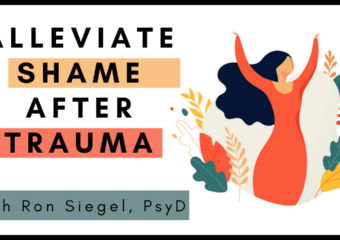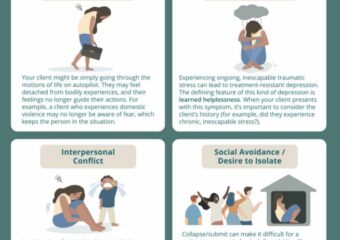When unthinkable events happen, your work as a practitioner becomes so much more crucial. And lately, it feels like we have been witnessing one unthinkable tragedy after another. As we grieve and process these events ourselves, we are simultaneously helping clients navigate the grief, disillusionment, and even hopelessness they may feel in the wake of […]
A Simple Metaphor to De-Shame a Client’s Trauma Response, with Ron Siegel, PsyD
After a traumatic event, a client might feel deeply ashamed by how they responded to the situation. Perhaps they froze and now blame themselves for not fighting back. Or, maybe they ran away, but now regret not standing up for themselves. As clinicians, we’re able to recognize that these reactions happen at the level of […]
[Infographic] – Four Key Ways Collapse/Submit Can Present in a Client
Like many of the emerging defense responses to trauma, the collapse/submit response can be difficult to recognize. So to give you a clearer idea of what this trauma response can look like, we created this free infographic that highlights four key ways it might present in a client. To put this infographic together, we gathered […]
Is Your Patient “Feeling” Unworthy? What May Be the Underlying Cause, with Janina Fisher, PhD
Trauma can leave a patient with a deep sense of unworthiness. On top of that, your client might even blame themselves for feeling this way. But as we know, there’s always a purpose behind a patient’s response to trauma. And sometimes, the challenge is getting your patient to see the wisdom behind their response – […]
A Three-Step Approach to Treating Trauma-Related Dissociation, with Thema Bryant, PhD
Dissociation can be tricky to spot. On top of that, it can look awfully similar to freeze or shutdown. And to complicate things further, a patient might dissociate when they’re in either one of those trauma responses. But being able to detect when a client is dissociating is critical for providing effective treatment. So in […]




